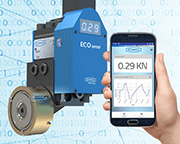E-Archive
Articles
in Vol. 21 - May Issue - Year 2020
Smart Measurement Device for Process Monitoring of Deep Rolling Process

Smart Measurement Device
Mechanical surface processing is utilised to modify near-surface properties of highly stressed parts. In this area, deep rolling is a very productive mechanical surface treatment that combines the generation of compressive residual stresses as well as smoothing and compacting of the surface. All three effects lead to a delayed crack generation and consequently to an increased lifetime of highly stressed components. Deep rolling tools can be divided into hydraulic or mechanical tools. Mechanical deep-rolling tools are available in a large variety of sizes and shapes for standard machine tools, allowing an easy integration into virtually every manufacturing procedure. Therefore, deep rolling is applied to a large variety of highly stressed and often safety-relevant components such as shafts, rims and turbine disks. Deep-rolled components are used in safety-critical applications like airplanes and cars; also, new applications like deep rolling of moulding tools are implemented as the induced compressive residual stresses lead to higher wear resistance.
Mechanical deep-rolling tools have a package of flat springs to generate a specific force. The required process force is applied by the machine tool that pushes the tool onto the rotating part surface. The force is determined by the displacement and the stiffness of the spring. These tools often feature a dial indicator that displays the deflection of the spring and allows calculation of the force for a given spring characteristic.
Induced compressive residual stresses can only be determined through destructive testing, for example through x-ray diffraction analysis. Testing can therefore only be performed on a very limited number of produced parts. If a mechanical surface treatment is not performed within the specifications, it is likely that the insufficient component properties will not be noticed until the component fails during operation, potentially with dramatic consequences.
While hydraulic deep-rolling tools can be monitored by measuring the fluid pressure and the flow rate, mechanical deep-rolling tools could only be monitored with great effort. Consequently, ECOROLL has developed a smart electronic measurement device that can be mounted on mechanical deep-rolling tools. The device uses an integrated circuit to sensor the rolling forces and thereby allows a variety of additional features. For instance, the device directly shows the actual force on the integrated LED-display and an integrated storage allows storage of the force curve of entire processes, regardless of the duration. After a process is complete, the device can evaluate the measure, if the force curve lies within specified limits, allowing a streamlined process monitoring.
The electronic measurement device also is wireless enabled, allowing additional functions. ECOROLL has developed an accompanying Android App that may be connected to the device. The App displays the current force as a live graph. This feature is particularly useful, when the machine operator has no straight view on the deep-rolling tool during setup of a new process. In that case, the live force graph supports the operator to avoid damaging the tool, the workpiece or the machine tool.
The wireless connection makes an easy access to the force curves possible, which are stored on the device for every single process. The recording is triggered by a process-dependent, adjustable threshold. By evaluating the force curves, the duration as well as the upper and lower limits of the process can be determined and compared to target values. Based on this evaluation, an individual process report is generated. By this means, a 100 percent verification of the deep rolling process becomes feasible.
A stationary bridge device is also in development that will be installed near the machine tool and can be connected to the company’s network. This will allow integration of the measurement device on the company level, making the process information available for further analysis. By this means, the deep-rolling process will be available for data-driven optimization approaches. Such approaches could take into account information from various process steps and quality control allowing to fine-tune all process steps to enable a zero-defects production.
The processing capabilities and the wireless connection of the measurement device will enable further applications in the future. Current research and development activities include the recognition of tool wear as well as a feedback system that uses the measured process forces to enable process control. Both technologies will further improve process reliability, process capability and process efficiency, since possible sources of error can be identified and eliminated before they affect the part quality.
As the outcome of mechanical surface treatments is hard to measure, process control is especially valuable to guarantee mechanical properties of highly stressed parts. Deep rolling allows determination of the process force by measuring the tool displacement during the deep-rolling process. The developed electric measurement device makes it possible to measure, store and evaluate the process forces continuously, simplifies the setup for new processes, contributes to more reliability and saves components. By incorporating a wireless interface, the obtained process information can be further processed. In this way, the smart measurement device will be the foundation for various optimization approaches.
For Information:
ECOROLL AG Werkzeugtechnik
Hans-Heinrich-Warnke Str. 8
29227 Celle, Germany
Tel. +49.5141.9865-0
Fax +49.5141.881440
E-mail: karsten.roettger@ecoroll.de
www.ecoroll.de



























